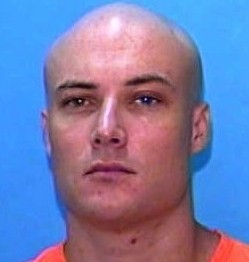|
Raleigh went to the back of the
trailer and shot Cox three times in the head at close range. Figueroa
and Raleigh each shot Timothy Eberlin, Cox’s roommate, until their guns
jammed. Eberlin was screaming so Raleigh beat him with his gun until he
was quiet.
After the murders, Raleigh and
Figueroa went to Raleigh’s residence. There they burned the clothes
they had worn during the murders, dumped bullets into a neighbor’s yard,
and hid their guns in a secret compartment within Raleigh’s Subaru.
That evening, the police went to
Raleigh’s home. Raleigh agreed to speak with them, but denied playing a
part in the murders. However, after being informed that Figueroa had
implicated him in the murders, Raleigh confessed to killing both Cox and
Eberlin. His confession was taped.
Additional
Information:
Raleigh’s mother was 15 years old when she gave birth to him. Raleigh,
to this day, does not know who his biological father is. At one point,
he believed that he was born from an incestuous relationship that his
mother had with her brother. Raleigh’s mother, however, denies the
claim.
Raleigh moved around frequently while he was growing up. For a while,
Raleigh lived at his grandfather’s house. While living there, Raleigh’s
mother was sexually abused by her father as a form of payment for the
accommodations. While growing up, Raleigh was also sexually abused. A
doctor testified to medical evidence of Raleigh being molested by age
four.
Raleigh failed and repeated the seventh grade. He dropped out of high
school in the tenth grade and eventually got his G.E.D.
At
18 years old, Raleigh attempted suicide by taking pills and pesticides.
He was evaluated by a psychiatrist who noted that Raleigh had an
adjustment disorder with a depressed mood, had problems relating to
others, exhibited poor judgment and lacked impulse control. Although
the psychiatrist recommended treatment, Raleigh’s mother decided against
it.
While Raleigh was in jail, a clinical neuropsychologist evaluated him.
The evaluation showed that he had deficiencies in judgment and acted out
of emotion rather than positive planning.
The neuropsychologist also
described Raleigh as depressed, tense, nervous and having difficulty
differentiating between fantasy and reality. He stated that Raleigh had
chronic feelings of insecurity, inadequacy and inferiority. The
neuropsychologist also concluded that Raleigh is a passive person with
low self-esteem who is easily manipulated by others.
Raleigh also has a history of drug and alcohol abuse.
Codefendant Information:
Domingo
Figueroa (Volusia County Circuit Court #94-0724
Domingo Figueroa, Raleigh’s
codefendant, received three life sentences for his part in the events
that took place on 06/05/94. Figueroa was sentenced for three counts,
two for first-degree murder and one count of armed burglary.
Trial Summary:
06/21/94 Raleigh was indicted on the following:
Count
I: First-degree Murder (Douglas Cox)
Count
II: First-degree Murder (Timothy Eberlin)
Count
III: Armed Burglary
Count
IV: Shooting into Building
06/24/94 Raleigh pled not guilty.
06/06/95 Raleigh pled guilty as part of a plea agreement.
The defendant pled
guilty to Counts I and II, and the State agreed to nolle prosse Counts
III and IV.
08/15/95 Upon
advisory sentencing, the jury, by a 12 to 0 majority, voted for the
death penalty on Counts I and II.
02/16/96 Defendant was sentenced as follows:
Count I: First-degree Murder (Douglas Cox) –
Death
Count II: First-degree Murder (Timothy Eberlin) –
Death
Count III: Armed
Burglary –
Nolle Prosequi
Count IV: Shooting
into a Building –
Nolle Prosequi
Case Information:
Raleigh filed a Direct Appeal in the Florida Supreme Court on 03/18/96
arguing a number of issues. Raleigh argued that the trial judge failed
to instruct the jury that he had no prior criminal history as a
statutory mitigator. Further Raleigh argued that the trial court
erroneously advised the jury to view the pecuniary gain of the armed
robbery as an aggravator and failed to give the requested instruction on
the CCP aggravator. Raleigh also claimed that a juror was dismissed
without legitimate cause. Next, Raleigh argued that several aggravators
such as avoiding arrest were erroneously found to be true.
He also
contended that several mitigating factors were not given proper
consideration. These mitigating factors included such issues as being
remorseful and cooperative and Figueroa receiving a life sentence.
Lastly, Raleigh argued that his death sentence is proportionate.
The
Florida Supreme Court found all fourteen of Raleigh’s claims to lack
merit and therefore denied the appeal and affirmed the convictions and
sentences on 11/13/97.
Raleigh petitioned the United States Supreme Court for a Writ of
Certiorari on 05/20/98. The petition was denied on 10/05/98.
Raleigh filed a 3.850 Motion in the Circuit Court on 11/17/98. The
motion was amended on 08/11/00 and 01/19/01 and subsequently denied on
03/24/03.
Raleigh filed a 3.851 Appeal in the Florida Supreme Court on 04/17/03.
The court reviewed four claims made by Raleigh. Raleigh claimed he
received an inadequate mental health evaluation and had ineffective
assistance of counsel.
Further, Raleigh claimed that the State
knowingly presented false testimonial evidence during his trial.
Lastly, he argued that his due process rights were violated by the State
taking inconsistent positions during trial on who the principal actor in
the murder of Eberlin was. On 06/01/06 after finding insufficient merit
in his claims, the Florida Supreme Court affirmed the denial of
Raleigh’s 3.851 Motion.
On
06/23/03, Raleigh filed a 3.851 Motion in the Circuit Court. The motion
was denied on 08/06/03.
On
12/30/03, Raleigh filed a Petition for Writ of Habeas Corpus in the
Florida Supreme Court. Raleigh argued two claims both stating that
Florida’s capital sentencing statute is unconstitutional. His first
claim regarded Apprendi v. New Jersey, 530 U.S. 466 (2000) and
his second claim related to Ring v. Arizona, 536 U.S. 584 (2002).
Raleigh’s petition was denied on 06/01/06.
Raleigh
filed a Petition for Writ of Certiorari on 06/21/06. The petition
is currently pending.
Floridacapitalcases.state.fl.us
|

